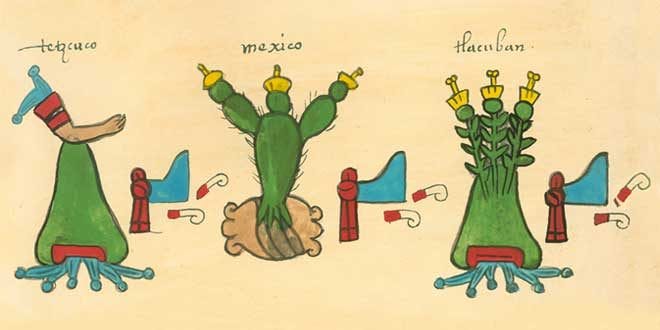Member-only story
What Does Mexico Mean?
Mexico comes from the Spanish “México,” a name derived from the Classical Nahuatl “Mēxihco,” a kingdom that encompassed most of the western shores of Lake Tetzcohco, Lake Xāltocān, and Lake Tzompanco, ruled from the famous island on which the twin cities of Tenōchtitlan and Tlatelōlco were established.
The “x” of Mēxihco is pronounced like English “sh.” The line above the “e” indicates that it is long (held twice the duration of a normal “e,” like the difference between the vowels in “bed” and “bet”). The “h” stands for a glottal stop (a sort of hitch in the back of the throat). “Mēxihco” breaks down into the root “mēxih” and the suffix of place “-co.” The meaning of “mēxih” is debated, though if we add the absolute suffix to the root (in order to make it a normal noun), we get something like mēxihtli or mēxitl. But what does that mean? There’s the rub.

The people we call Aztecs were principally governed by the inhabitants of Mēxihco Tenōchtitlan (the full name of Mexico City in Nahuatl). They called themselves Mēxihcah or Tenōchcah and claimed that before settling in the Valley of Mexico they had been known as the Mexihtin. This ethnonym, they affirmed, was derived either from the name of the leader who guided them out of the mythical land of Aztlan, Mecihtli (“agave hare”), or from Mēxihtli, a title of the tribal god Huitzilopochtli.
On this view, then, Mēxihco means “land of the Mexihtin” or “land of Mēxihtli.” The problem with “land of the Mexihtin,” however, is the vowel: the long “ē” of Mēxihco would not normally arise from the short e of Mexihtin (this also makes it unlikely that Mexihtin would derive from Mēxihtli).
Other etymologies have been proposed, even during the time of the Triple Alliance. The lake in the midst of which the Mexihtin found an island to settle upon was called by the nearby inhabitants “Mētztli īāpan” or “Moon Lake.” It has been posited that this island in the center of Moon Lake would have been referred to as “Mētztli īāpan īxīc” or “the bellybutton of Moon Lake,” perhaps shortened to “Mētztli īxīc” / “Mētzxīctli” (bellybutton of the moon). This hypothetical word is formed along the same lines as “Tlālxīctli” (bellybutton of the earth), which was the name of Tenōchtitlan’s temple to the god of the underworld, Mictlāntēuctli.






